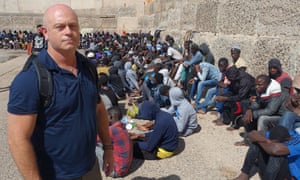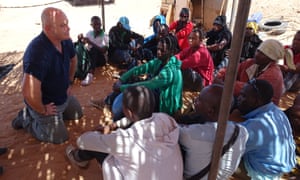
It’s a mass grave that we don’t need the United Nations to verify. Every day an average of 14 migrants, the vast majority from countries in sub-Saharan Africa, die crossing the Mediterranean.
Many more see their European dream turn into a nightmare long before they’re corralled on to flimsy rubber dinghies on Libya’s beaches. They’re the victims of a silent massacre in the Sahara desert a journey more deadly than the crossing from the coast, according to the International Organisation for Migration. Come the spring, thousands of migrants and refugees fleeing poverty and violence will die in Libya, but I doubt you’ll hear much about it.
Compassion fatigue has set in. The numbers have become too big to comprehend. It’s an old story; we feel numbed by the now-familiar news images of men huddled together on boats. Maybe it’s because they’re African and have been written off as “undeserving economic migrants”. These are the people some of our political leaders have in mind when they talk of swarms, plagues and marauders. The understandable focus on Syrian refugees has taken the spotlight away from the more dangerous route to Europe through Libya.

Or maybe it’s because, with three rival governments presiding over anarchy in Libya, and the real power lies in the hands of armed militias, getting inside the country to tell the story is just too difficult and dangerous. One thing is becoming clear many people have come to see this tragic situation as though it were more a problem for us than for the migrants. We have stopped caring about them. As a documentary-maker, I believe it’s our job to make people care. That was the reason my team and I went to Libya to try to shine a light on the under-reported plight of migrants away from the coastline and to tell the human stories of the men and women making the journey. What I saw there is nothing short of the modern-day slave trade, with migrants treated as commodities. It’s as though nothing has changed in the 300 years since desert tribes used the very same routes to bring slaves to North Africa: Nigerian women told they are going to Italy to work as housemaids only to be trafficked into desert brothels with no idea when they might leave, young men cruelly have beaten and held captive for months until their families pay a ransom, women forced to take contraception to stop themselves becoming pregnant at the hands of smugglers. What makes their plight even sadder is that most have no idea what sort of country they’re entering. I saw this when I spoke with men and women at the very start of their journey dazed and battered from the drive across the desert border with Niger but filled with naive optimism. Not only are they at the mercy of people smugglers but also the authorities themselves in the main, armed militias with no one to hold them to account and few other sources of income apart from the migrant trade. In the desert town of Brak, I met a young man who told me he had no choice but to work for a smuggling ring ferrying migrants to a handover point on the back of a pickup. While Libyans may rely on their own militias for protection, the migrants have nothing and no one to protect them. When they are intercepted by what authorities do exist in the country, they are taken to squalid, overcrowded warehouses generously referred to as detention centres. In one centre for women in the coastal town of Surman, I met Aisha, a young Nigerian. She was bleeding to death after giving birth to her baby girl on the toilet floor. The child died three days later. Since coming home we have tried but been unable to find out what has happened to Aisha. I fear the worst. Even in the worst refugee camps in the world, there is often food, medical facilities and aid workers to offer support. In the Libyan detention centres, migrants are locked up and left to rot. It’s a humanitarian disaster with barely any humanitarian organisations there to help. For tens of thousands of migrants in the country at the moment, they have no means of escape. Libya doesn’t want them, Europe doesn’t want them and even their own countries don’t want them. We have a heightened responsibility towards Libya because of the role Britain played in bringing down Muammar Gaddafi’s dictatorship with no strategy for what was to come next. In the five and a half years since his death, lawlessness and anarchy have created the perfect conditions for people smuggling to thrive. Last month, EU leaders under pressure to stop the tide of migrants traveling to Europe signed a deal with Libya. Far from helping people escape, this deal is aimed at keeping them there. It’s only one step away from forcibly returning them. Whatever your view on the migrants’ rights, forcing them back into the conditions we know they will experience in Libya is far from a humane solution. Conditions for migrants in the country need to drastically improve and until there is evidence of this, can we really consider the current deal an acceptable solution to such a horrific situation?